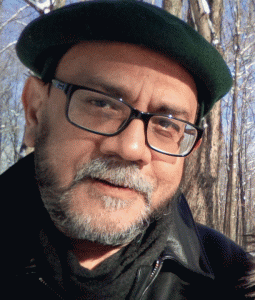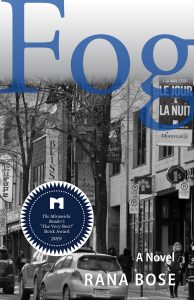 (11 May 2023) Rana Bose left his family and friends yesterday after a long and courageous struggle with cancer. This review of the last book he wrote and presented to the world while already ill was written by Maya Khankhoje, who has given us permission to publish it.*
(11 May 2023) Rana Bose left his family and friends yesterday after a long and courageous struggle with cancer. This review of the last book he wrote and presented to the world while already ill was written by Maya Khankhoje, who has given us permission to publish it.*The story of Shaf and the Remington starts off with the assassination of Archduke Franz Ferdinand, then arches up with Adolph Hitler’s rise to power and his invasion of Poland and pauses with the end of World War II. The story then follows the Cold War all the way to the thawing of international relations with Mikhail Gorbachev’s glasnost and perestroika in 1985. What a narrative arc!
Notwithstanding a turbulent century and the presence of a Remington as an iconic protagonist in this story, Shaf and the Remington is not a tale of war. It is a tale of life, of the lives of real people and an affirmation of their capacity to live together in peace as good neighbours in spite of their different languages, religions, ethnic origins and dietary habits. It is the story of humanity’s resilience and its innate impulse towards peace and conviviality, if only… if only false prophets and purveyors of weapons did not meddle. It is a story that speaks to us today.
This is indeed a complex novel with a deep subtext, and numerous flashbacks and flash forwards. It is narrated from different viewpoints in different locations and at different times but this should not deter readers. Just the opposite. Bose, the writer, resorts to playful language and a light touch to deftly reduce a complex human universe to its simplest subatomic components. Bose, the engineer, cleverly resorts to quantum physics, to explain to readers that human behaviour is not subject to a linear analysis. The author zeroes in on the very core, which simply means heart.
All the characters are endearing, except, of course, the evil ones whose names have survived in history books that may be rewritten and in monuments that may be toppled over. There is Shaf, a lover, a partisan, a mentor, whose life is a mystery to be decoded. Then there is Ben, a young boy who follows Shaf’s science lessons but winds up learning much more. And Bo, a father, absent physically more often than not, yet very much present in people’s hearts. Not to forget the grandfather, an imposing yet distant figure, very much a product of his times. Nika is a young woman yearning to break free from social constraints. There are also two mothers, one whose heart will be broken and another one who will break a heart. Several minor characters are mostly off scene but at some point make their relevance known. Sabzic is the name of the fictitious town where the events play out, but history buffs will quickly identify it as the Balkan city shattered by several 20th Century conflicts.
 The ending closes the loop and returns to where the story began, for another generation to take over. It is no coincidence that Rana Bose has dedicated this book—his best in his compact corpus of novels—to Josephine Chameli, Colette Daisy and Fran Amiya, not merely as an affectionate gesture from a doting grandfather to his young grandchildren, but as a pledge—and a token of faith—for them not to repeat history.
The ending closes the loop and returns to where the story began, for another generation to take over. It is no coincidence that Rana Bose has dedicated this book—his best in his compact corpus of novels—to Josephine Chameli, Colette Daisy and Fran Amiya, not merely as an affectionate gesture from a doting grandfather to his young grandchildren, but as a pledge—and a token of faith—for them not to repeat history.Review by Maya Khankhoje
[Full disclosure: Maya Khankhoje is a long-time colleague and friend of the author but she never reviews a book, from either friend or stranger, unless she finds it of great interest to readers at large. This novel more than fits the bill.]
 * Baraka Books will honour Rana Bose in the near future. Rana is the author of four novels including two that Baraka Books is proud to have published, Fog (2019) and Shaf and the Remington (2022).
* Baraka Books will honour Rana Bose in the near future. Rana is the author of four novels including two that Baraka Books is proud to have published, Fog (2019) and Shaf and the Remington (2022).


Facebook